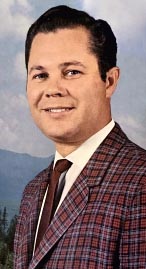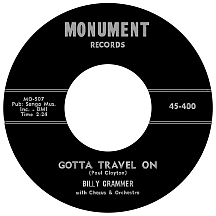BILLY GRAMMER
Gotta Travel On
Being the oldest of 13 children was a stroke of luck for Benton, Illinois native Billy Grammer. Less competition for attention (before the battalion of younger siblings arrived) meant more time with his parents. His father, Arch Grammer, was a country fiddler who passed his love of music to his son; when he was five, Billy learned guitar and after a few years he and dad occasionally performed together publically. In 1940, at age 15, Billy began singing and playing live on WJPF, a station in Herron, a little ways down the road from his hometown. After serving in the Army near the end of World War II, he worked as a toolmaker at a naval gun factory in Washington, D.C. but gave it up for a career in music, lots of road tours covering thousands of miles, channeling the experience into his first recording, "Gotta Travel On"...a hit on the first try!
By 1958, Billy was performing on country station WARL in Arlington, Virginia, not far from where Jimmy Dean hosted a 30 minute weekly TV show on WTOP channel 9 in D.C., broadcast nationally on CBS in the summer of 1958 and later on the network's daytime schedule through mid-'59, during which time Grammer played in Dean's band, made connections and ultimately signed a contract with Monument Records, a new label headquartered in Nashville, Tennessee and run by former ABC-Paramount A&R man Fred Foster.
Paul Clayton, a folk singer from New Bedford, Massachusetts, had attended college in Charlottesville, Virginia and remained in the area. A recording artist for the New York-based label Folkways, he'd written lyrics for a tune from the late 1920s (perhaps much earlier) adapted to several different sets of lyrics (one title was "Yonder Comes the High Sheriff"). Pete Seeger and The Weavers recorded the song in 1958 as "Done Laid Around" with some verses of their own, each member taking writer credit alongside Clayton. Grammer recorded the song later in the year as "Gotta Travel On," sticking closer to the lyrics Clayton (who took full credit this time) had written: 'I've laid around and played around this old town too long...summer's almost gone, yes, winter's comin' on.' Running a fine line between folk, C&W and pop, his recording went top ten at both pop and country in early '59 and even made a top 20 showing on the rhythm and blues charts. Success seemed to come quite easily.
Several covers followed B.G.'s lead, among them a jazzier folk rendition by Harry Belafonte and a faster banjo-pickin' version by Bill Monroe and his Blue Grass Boys that reached the country top 20 in March. But by that time Grammer owned the tune in listeners' minds, consequently naming his band The Travel On Boys. The next single was a two-sided hit: "Bonaparte's Retreat," a bouncy axe-strumming take on Pee Wee King's heavy-fiddlin' 1949 original, was backed by "The Kissing Tree," a sweetly romantic song penned by nearby Richmond writing team Carl Stutz and Edith Lindeman (their main claim-to-fame: "Little Things Mean a Lot," a chart topper for Kitty Kallen in '54).
In attempting to achieve a childhood dream of performing on Nashville's Grand Ole Opry, Billy hit a snag: there was some debate among Opry bosses as to whether he was a good fit for the more traditional (pop-avoiding) weekly event. But he came on as a guest and won them over with his personality and impressive guitar skills. While the Ryman faithful accepted him, the charts were less penetrable; subsequent Monument singles (Felice and Boudleaux Bryant's "Willy, Quit Your Playing" and "Loveland," an original Billy had written with rocker Kent Westberry) failed to connect. Leaving Monument, he made a bid for a top 40 return with the spring '61 single "Princess of Persia" on the Everest label, a cheesy-fun exotica/teen tune (there's a category for you!) that all Grammer fans must hear, otherwise they won't believe it exists.

When that didn't work, he did a Mel Tillis song, "Big, Big Dream," then signed with Decca and hit the country top 20 with Tillis and Danny Dill's "I Wanna Go Home," a song so well-written and sensitively delivered that Bobby Bare instantly covered it (under the title "Detroit City") and scored an even bigger hit a few months later, putting a damper on Grammer's long-awaited resurgence. The good news: he continued racking up mid-charting singles ("I'll Leave the Porch Lights A-Burning" saw some action in '64). Though hits were few and far between, his star continued shining at the Opry and through appearances on old pal Jimmy Dean's new hourlong ABC-TV variety series while his fan base kept growing. Moving to Epic Records in 1966, he scored two top 40 country entries: sad-drunk song "Bottles," an early composition by L.L. Favortie and future country/pop star Eddie Rabbitt, and Roy "Charlie's Shoes" Baham's "The Real Thing."
An even bigger dream (than having a hit or being on the Opry) was realized in the mid-'60s. Billy designed the Grammer Flat Top guitar (his youthful experience as a toolmaker giving him an advantage) and started a company based in Nashville, RG&G, with top-tier woodworker J.W. Gower and investor Clyde Reid. In 1965, after considerable work designing and building a prototype model, the Grammer Guitar was marketed, each specimen handcrafted at the rate of one per day (about a thousand were made over the next three years), a high quality yet affordable instrument (around 400 dollars) that was very popular among Music City's elite musicians. Despite a problem with supply struggling to meet demand, the price was kept reasonable (to put it another way, they'd gained the respect of music aficionados but didn't get rich). Custom models were eventually made in a variety of colors and finishes.
As it became more difficult to meet demand, the three-man partnership was dissolved and the rights to produce the guitars were sold to Ampeg, a company that had been manufacturing electronic amplifiers since the late '40s. For the next few years the guitars became more accessible and many of the top names in country music (Johnny Cash, Lester Flatt, Porter and Dolly) and a few rockers (Mick Taylor of The Rolling Stones had one) appeared in concert or on television sporting one or more Grammers. The Ampeg deal had given Billy a regular, no-risk source of income: a percentage of every piece sold.
During the late '60s, he worked as a session player on recordings by Eddy Arnold and others including Patti Page during the country phase of her career. Billy had a few more notable singles as well: "Mabel (You Have Been a Friend to Me)" on the Rice label in '67 and "The Ballad of John Dillinger" on Mercury in '68 were both penned by Tom T. Hall. He also charted with a cover of Lawrence Reynolds' "Jesus is a Soul Man" on the Stop label in 1969.
While appearing from time to time on 1970s variety shows like Hee Haw, Billy settled in as a regular at the Grand Ole Opry. His eyesight began failing and he lost his vision completely at some point in the 2000s but made occasional appearances for a few more years, voice and guitar technique as strong as ever. Billy Grammer retired from the Opry in 2009 at the 50-year mark, a feat of longevity matched by few. Grammer Guitars remain a favorite of many musicians despite being out of production for many years; early models (especially the rare "green sunburst" variant!) are highly collectible.


